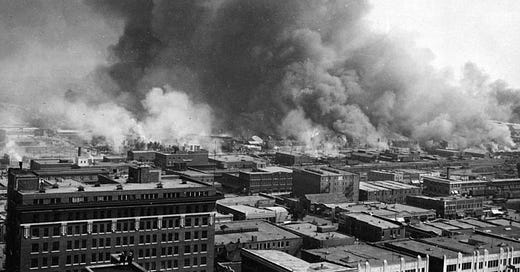‘We Don’t Grasp the Meaning of Race in this Country, Because It’s Not Taught’
Centennial of Tulsa massacre could reflect a new chapter in nation coming to terms with racist legacy
If the murder last year of George Floyd on a crowded Minneapolis Minn., street corner at the hands of a white police officer sparked a new chapter in the nation's reckoning for racial justice, this weekend's solemn centennial observation of the Tulsa Race Massacre perhaps will turn a page on its struggle to come to terms with what is a history of racism.
Black community leaders in Tulsa Oklahoma joined together with dignitaries who had come from all across the country — including President Biden — to mark 100 years since white Tulsans rampaged into the prosperous Black neighborhood of Greenwood known as “Black Wall Street,” in what would become the nation's deadliest race massacre.
Hundreds of Black Tulsans were murdered, the Greenwood neighborhood was left in smoulders and thousands were homeless. (Indeed, white aggression was so virulent that news reports from the time tell of aircraft from the period flying over Greenwood, with pilots dropping primitive bombs on the community.)
Tulsa and the state of Oklahoma have begun to come to terms with the horror of those dark days only in recent years.
It's been another case of convenient amnesia, which too often has helped prevent the nation from grappling with its racism in a more-clear-eyed way with an ultimate goal of moving forward.
“Of course, then you look at what happened in Tulsa, and we have images today of hundreds of World War I Black veterans from World War I being rounded up and put into the equivalent of local concentration camps and many of them lynched. It’s a very harsh, difficult history that really is I think still prescient today when you think about we still have survivors from this,” said Mara Gay, a Black member of the New York Times editorial board. "The other reason this is an important story is because I think Americans, especially white Americans, but Americans in general tend to be very good at forgetting history, but also tend to think that slavery was a very long time ago and that discrimination was a very long time ago. The reality is not — that’s just not the case.”
Mike Barnicle, a contributor on MSNBC's Morning Joe, agreed with Gay.
“And I would submit that before we can talk about this really collectively, as a country, as a people, we’re going to have to learn about it. We don’t know about these things in America. It’s not taught. Tulsa is not taught, really, in schools,” he said, referring to the massacre. “It might be now, but it hadn’t been for years and years and years. You could take a picture of what happened in Hiroshima and match it up against a picture of what happened in Tulsa 100 years ago and it would be hard to tell the difference. And the difference, of course, is rooted in race.
"We just don’t grasp the meaning of race in this country because it’s not taught in our schools. Our children really don’t know the meaning of race in this country because it’s just not taught,” Barnicle added.
There's a direct connection between the struggles of Black and other oppressed Americans, and the health of American democracy, Gay said.
“One of the things that we really, I hope, can start to understand is that Black Americans, the struggle that we’ve had over the hundreds of years in this country for recognition as human beings and as citizens, there’s a direct link between the status of our citizenship and the status and health of our democracy," she said. "So the movement for equal justice, for Black Americans, also for Native Americans, for women, is at the very heart of whether this is a democracy and an experiment that will work or that won’t.
"And that is what is at stake right now. And of course, it’s an inclusive vision. It’s not just Black Americans. It’s just — this is what we need to understand. We need to start talking about how we talk about this instead of trying to avoid talking about it,” she added.




